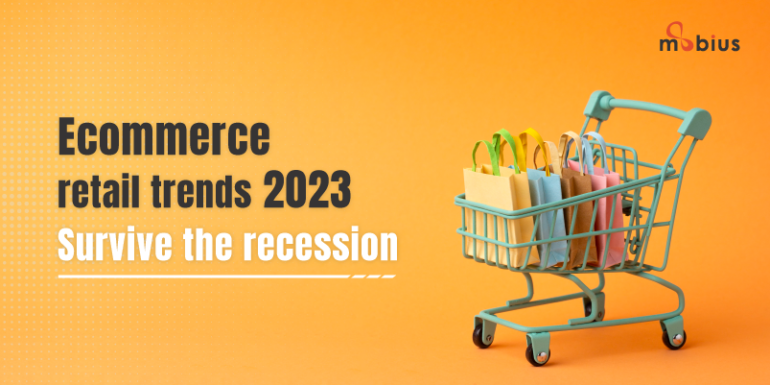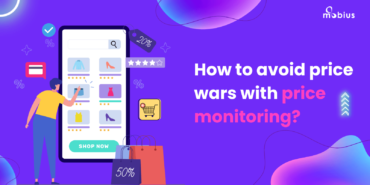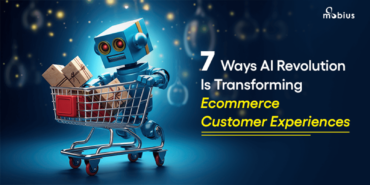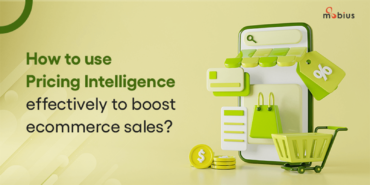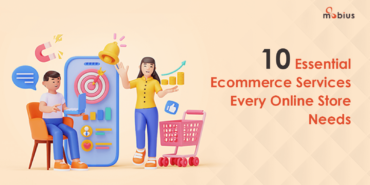Not knowing the emerging ecommerce retail trends when stepping into a new year can be like entering uncharted territory for ecommerce business owners. You can only recognize and monetize opportunities if you know what market shifts to expect. Well, you are in luck. This blog will help you understand what ecommerce expects in 2023 and how you can cash in on your ecommerce business.
When anticipating future online shopping trends, it’s always good to look back and understand the retail trends of the past because those trends may continue. Let’s begin with some staggering trends of 2022 that will provide insights into which direction your business needs to head in 2023.
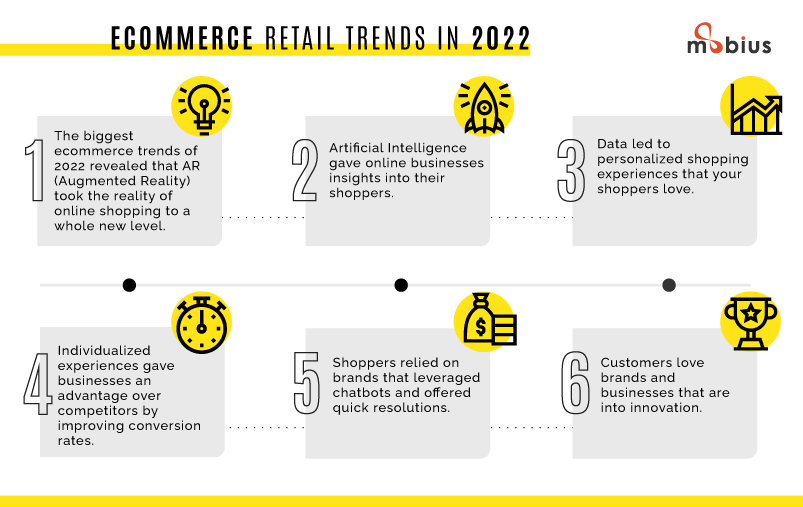
Beat the recession with these ecommerce retail trends
Every ecommerce business is facing the heat with the prediction of a recession in 2023 that will hit most developing countries. Inflation, high cost, and furloughs will be the domino effect and affect consumer buying decisions and spending. And while you cannot control these aspects, there are certain things you can do to keep your business afloat during this economic downturn.
If, as an ecommerce company, you anticipate the shift in consumer behavior and expectations, you can continue to grow your business this year despite the recession successfully. These ecommerce retail trends from 2022 will continue to help ecommerce businesses this year.
Let’s dive right into it, then!
1. Artificial Intelligence for ruling the market
AI has been helping businesses across industries above and beyond with automation, personalization, and much more. Increasingly, companies invest in artificial intelligence to streamline their operations and processes. As a result, organizations can reduce their workload while generating better results.
By investing in AI-backed solutions or platforms for your ecommerce business, you can understand the market more effectively and make smarter decisions. For example, a competitive intelligence solution can help you learn about the market changes as you monitor your competitors’ every move regarding what products they choose to sell and at what prices.
Additionally, you can learn about your online shoppers and their needs. Knowing the shifts in customer preferences and demands will allow you to make quick decisions by understanding the essentials for your customers and offering them just the right products.
2. Data-driven decisions for assured success
We know that you know data is the new oil. But are you making data-driven decisions in your business? If your answer is no. Consider leveraging data for your ecommerce business, as it will be one of the major ecommerce trends in 2023 across industries.
Data analytics can help ecommerce companies in multiple ways, including measuring the performance of their product listings, delivering insights for decision-makers, establishing an omnichannel presence, and making the most of their marketing campaigns.
Look at it this way. A retailer or brand sells products on a particular marketplace A, but online shoppers prefer shopping for products from marketplace B since it offers them faster shipping. If the retailer or brand does not have a presence on marketplace B, they are largely losing out on selling opportunities. Data insights on various marketplaces and customers can help you foresee these opportunities and make the most out of them.
Forecast and pivot the latest ecommerce trends
Our end-to-end ecommerce services are designed to help you get insights into every aspect of your business. Reimagine your crucial business processes, implement automation and the right technologies for price monitoring, catalog management, and more.
3. Hyper-personalized shopping experiences for increased conversions
Customers love when ecommerce businesses put their heart and soul into delivering ultra-personalized shopping experiences. By leveraging AI and data insights, you can make it possible for your online business to offer customers a hyper-personalized, on-site experience.
For example, you can learn what products a particular customer buys and how often. And the next time they come to buy products, you can show them personalized recommendations unique to that individual and even recommend related products based on their browsing preferences or purchase history.
Another great example would be recommending products based on the shopper’s location. Suppose you are using data to learn about customer location. You could offer them product recommendations based on the weather, holidays, market shifts, etc. Hyper-personalized shopping is becoming increasingly relevant to online customers who need to feel your offerings are tailor-made for them. Such thought-driven shopping experiences will make you stand out from the competition and generate better conversions.
4. Mobile shopping to widen customer reach
A massive number of customers love shopping on the go. If you are already offering your customers the convenience of shopping on their mobile devices, we say you have covered it. But it’s a different story if your ecommerce site is not optimized to work well on mobile devices. In such cases, you are missing out on big opportunities.
Recent data shows that ecommerce sales through mobile devices reached $3.56 trillion in 2021, an increase of 15.2% compared to 2020. And this graph is only moving upward. Most shoppers today are mobile users who love the convenience and the option of making digital payments.
5. Automated customer support for higher retention
It is easier for shoppers to trust retailers, brands, or marketplaces when shopping online if you deliver them a positive experience post-purchase. Online shoppers value marketplaces that offer quick resolution and adequate support. But it is challenging for ecommerce companies to provide a top-notch customer service experience to their customers, especially when their customer base keeps growing. Paradoxically, excellent customer service, in turn, leads to a growing customer base.
However, with the emergence of automation, businesses are in a better place to offer excellent customer support to their customers. Take chatbots, for example. They are a rage today. Almost every website uses them to allow quick conversations and resolutions without human intervention unless absolutely necessary.
You should be good if you are willing to invest in an AI-driven customer support solution. You can automate chat, email, and even call support and take the back seat to focus on more critical areas of your business while ensuring that your customers are satisfied.
Leverage the right technology to align your business with emerging online shopping trends
It is evident that technology is important for your ecommerce business if you want to grow faster. And with the outset of the global recession this year, business challenges will only extend. The best way to tackle these challenges would be to learn which of these ecommerce retail trends apply to your business. You can reach out to ecommerce solutions providers and outsource some of the business processes to professionals.
They can help you with automation, streamlining your everyday processes while saving you time and money. Additionally, investing in data solutions will allow you to make the right decisions for your business with accurate predictions on how each decision will impact your business. Make confident business decisions this year and mitigate the risks associated with guesswork.


